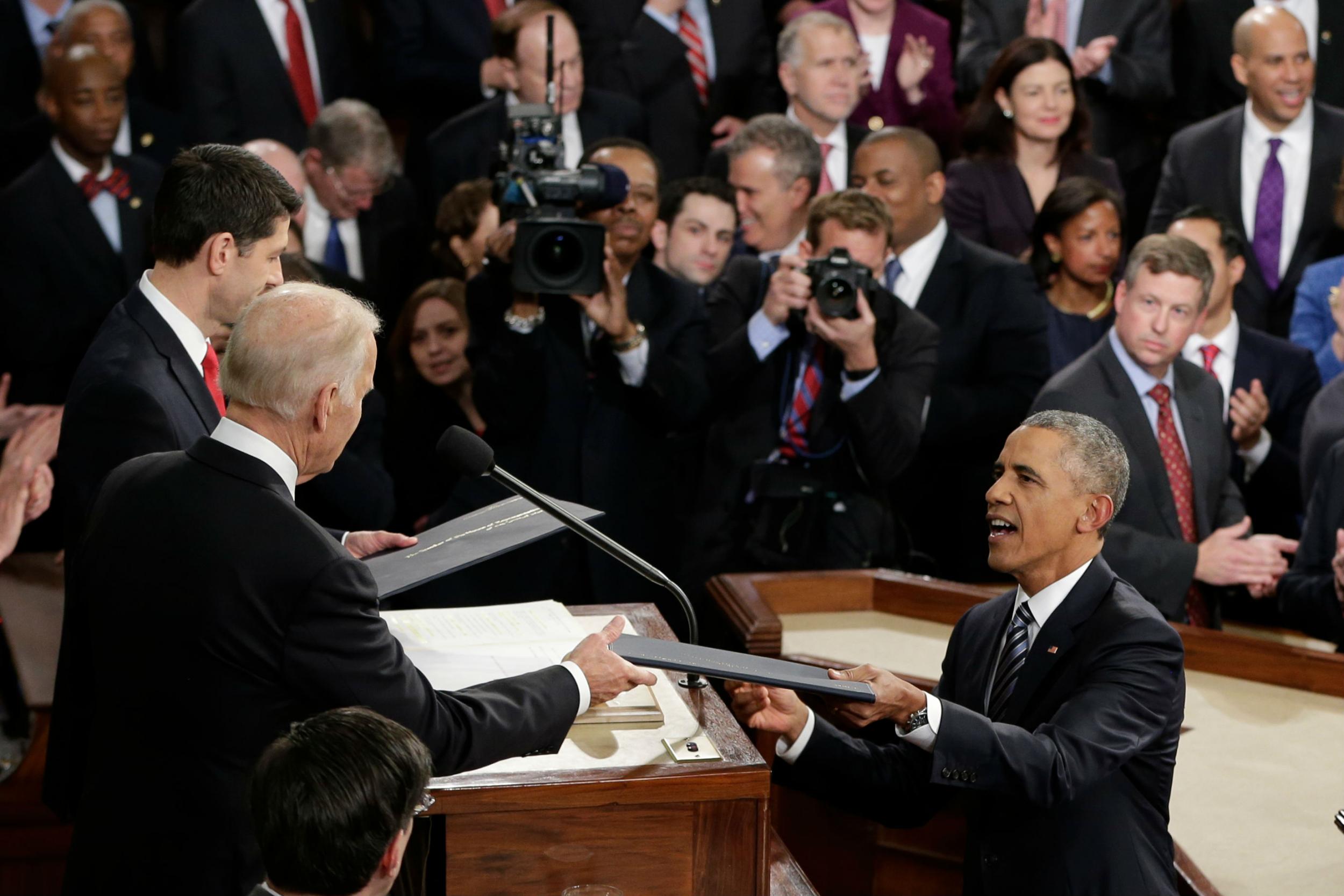State of the Union: Obama says American politics more toxic than when he took office
Mr Obama said he wanted to look to America's future, not just the next 12 months

Your support helps us to tell the story
From reproductive rights to climate change to Big Tech, The Independent is on the ground when the story is developing. Whether it's investigating the financials of Elon Musk's pro-Trump PAC or producing our latest documentary, 'The A Word', which shines a light on the American women fighting for reproductive rights, we know how important it is to parse out the facts from the messaging.
At such a critical moment in US history, we need reporters on the ground. Your donation allows us to keep sending journalists to speak to both sides of the story.
The Independent is trusted by Americans across the entire political spectrum. And unlike many other quality news outlets, we choose not to lock Americans out of our reporting and analysis with paywalls. We believe quality journalism should be available to everyone, paid for by those who can afford it.
Your support makes all the difference.He knew it was the final time he would be delivering a State of the Union address, and Barack Obama, decidely older and greyer than when he came to the White House, laid out his dreams for the country once he leaves office.
There had been many achievements, he insisted, including overseeing “the strongest, most durable economy in the world”, confronting the threat of climate change, securing the Trans-Pacific Partnership to open markets, and protecting workers and the environment.
He said in his remaining 12 months he could continue to work on the issues that continued troubled him – “fixing a broken immigration system, protecting our kids from gun violence. Equal pay for equal work.” He said that the welfare systems of Social Security and Medicare were more important than ever.

But given that this was his last address, Mr Obama said he wanted to look further into the future.
“For my final address to this chamber, I don’t want to talk just about the next year. I want to focus on the next five years, ten years, and beyond,” he said.
He added: “We live in a time of extraordinary change - change that’s reshaping the way we live, the way we work, our planet and our place in the world.
“It’s change that promises amazing medical breakthroughs, but also economic disruptions that strain working families. It promises education for girls in the most remote villages, but also connects terrorists plotting an ocean away.”
Without naming those Republicans such as Donald Trump, Ted Cruz and Chris Christie who had been outspoken on the issue of immigration and who had sought to raise the spectre of the threat posed by Muslim refugees, Mr Obama turned to history to say the US had confronted – and seized momentum – from change in the past.
“America has been through big changes before - wars and depression, the influx of immigrants, workers fighting for a fair deal, and movements to expand civil rights,” he said.

“Each time, there have been those who told us to fear the future; who claimed we could slam the brakes on change, promising to restore past glory if we just got some group or idea that was threatening America under control.”
Mr Obama insisted that the US remained the most powerful and influential nation in the world, from Asia to the Middle East, and said its military had no parallel.
He said America’s foreign policy should focus on the threats from Isis and al-Qaeda, and warned that instability will continue to be the norm in many parts of the world. And he said that the world will continue to look to the US to “help solve these problems”.
“Our answer needs to be more than tough talk or calls to carpet bomb civilians. That may work as a TV sound bite, but it doesn’t pass muster on the world stage,” he said.
“There’s a smarter approach, a patient and disciplined strategy that uses every element of our national power. It says America will always act, alone if necessary, to protect our people and our allies; but on issues of global concern, we will mobilise the world to work with us, and make sure other countries pull their own weight.”
When Mr Obama first ran for the presidency – buoyed by the slogan 'Yes We Can' – he vowed to try and change the nature of politics in Washington and put a halt to the bitter levels of partisanship.
Yet he said that in this challenge, he had failed.
“It’s one of the few regrets of my presidency—that the rancour and suspicion between the parties has gotten worse instead of better,” he said.
“There’s no doubt a president with the gifts of Lincoln or Roosevelt might have better bridged the divide, and I guarantee I’ll keep trying to be better so long as I hold this office.”
Join our commenting forum
Join thought-provoking conversations, follow other Independent readers and see their replies
Comments